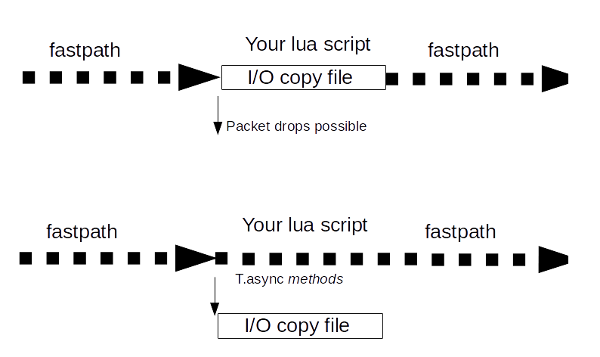Asynchronous execution
This section describes the concepts behind async execution within Trisul LUA scripting framework. Please refer to T.async documentation for function reference. This section explains the motivation and design of this execution model.
Table T.async
The T.async interface provides methods to help you do long running I/O tasks that do not block the streaming pipeline. The tasks are executed by a separate worker thread pool and when the results are ready, they re-enter the pipeline path. The number of worker threads is by default 1 but can be increased by the request_async_workers parameter at the plug-in level.
Purpose of T.async
Recall that the Trisul LUA api supports ‘frontend’ (fast path) and ‘backend’ (slow path) scripts.
The T.async methods are designed for use in scripts that are involve some I/O that can block the streaming pipeline.
- when frontend scripts block : can result in packet drops
- when backend scripts block : backend script have more time budget than front end scripts, but if they block it can result in some metrics being lost because Trisul being a real time streaming engine requires all backend work complete in under 60 seconds.
Using the methods in T.async you can perform these tasks out of the main pipeline in a separate thread pool.

Number of async worker threads
Use the global parameter TrisulPlugin.request_async_workers to change the default number of worker threads (1).
Usage
This small snippet shows the use case
Copy the file pointed to by path into /tmp/xyz.txt file
There are two ways to approach this
- method 1: copy the file directly in lua. synchronous method.
- method 2: use the async interface to copy the file
Method 1 : Copying a file inline (blocks fast path)
-- save path to /tmp/xyz
-- os.execute returns only when copying is complete
-- this blocks the packet pipeline can cause packet loss in fast networks
os.execute( "cp "..path.." /tmp/xyz.txt")")`
This would work, but the problem is while the os.execute(..) is copying the file, the packet pipeline is blocked. This may result in packet loss. We therefore recommend that whenever you do I/O you use any of the T.async methods.
Method 2 : Copying a file async (does not block fast path)
This method uses the T.async:copy function to do this async
-- save path to /tmp/xyz
-- T.async run outside fast path, so returns immediately
T.async:copy( path, "/tmp/xyz.txt")
Method 3 : Copying a file using T.schedule
T.async:schedule described in the next section allows you to run any lua function out of the fast path and then call back in when results are available. Here is how you would do it using that method.
T.async:schedule(
{
-- set data as the file path
data = path,
--
-- [ on slow path, another thread with indata = data ]
onexecute = function( indata)
os.execute( "cp "..indata.." /tmp/xyz.txt")
end,
}
)
T.async:schedule
Purpose
Run arbirary LUA code in async manner
T.async methods cp cat accomplish very specific tasks. Using the T.async:schedule method you can run any arbitrary LUA code off the main packet pipeline.
Methods
T.async:schedule expects a table with the following fields
| Name | In | Description |
|---|---|---|
| data | string | a string that is passed on to the onexecute function below |
| onexecute | function( in_data) | called on separate worker thread A function that accepts the data string specified. This function executes in a separate thread/task from the packet pipeline. You do your processing and optionally return a ‘response’ string. See rules below |
| onresult | function(engine, in_data, out_data) | called on main Trisul thread if your script in onexecute on the separate thread returns string, Trisul will re-enter the fast path and call the onresult function with the result string. You can then update the engine parameter by adding metrics, generating alerts, or interact with Trisul in any way |
Skeleton async execution
Use this skeleton.
T.async:schedule(
{
-- the data
data = path,
-- [ on slow path, another thread ]
-- and return the string
onexecute = function( indata)
return "result string"
end,
-- [ back on fast path]
--
onresult = function(engine, req, response)
end
}
)
end,
Usage
This small snippet shows the usage
Task: calculate sha1sum of extracted file
onfile_http = function ( engine, timestamp, flowkey,
path, req_header, resp_header, length )
T.async:schedule(
{
-- send the file path
--
data = path,
--
-- [ on slow path, another thread ]
-- calc sha1sum on the file
-- and return the string
--
onexecute = function( indata)
local h = io.popen("sha1sum "..path)
local sha1 = h:read("*a")
h:close()
return sha1
end,
--
-- [ back on fast path]
--
onresult = function(engine, req, response)
print("The SHA1 sum of "..path.." IS " .. response)
end
}
)
end,